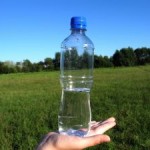Stretch Your Food Dollar: Ditch Those Water Bottles
 It’s summer time, so it’s not surprising that most people carry around bottled water as if it were a pacifier. I live in the desert. Water is a must. But I ditched individual bottles of water a long time ago and made the switch to reusable bottles as a way to stretch my food dollar. The cost of individual bottles adds up quickly, and all those plastic bottles have a negative impact on the environment. I understand that people distrust tap water, but a reusable filter like a Brita pitcher or a Pur faucet filter work just great.
It’s summer time, so it’s not surprising that most people carry around bottled water as if it were a pacifier. I live in the desert. Water is a must. But I ditched individual bottles of water a long time ago and made the switch to reusable bottles as a way to stretch my food dollar. The cost of individual bottles adds up quickly, and all those plastic bottles have a negative impact on the environment. I understand that people distrust tap water, but a reusable filter like a Brita pitcher or a Pur faucet filter work just great.
Roland tipped me off to the latest bottled water trend. Apparently, a town in Australia has banned bottled water altogether.
Residents of Bundanoon cheered after their near-unanimous approval of the measure at a town meeting Wednesday. It was the second blow to Australia’s beverage industry in one day: Hours earlier, the New South Wales state premier banned all state departments and agencies from buying bottled water, calling it a waste of money and natural resources . . .
Over the past few years, at least 60 cities in the United States and a handful of others in Canada and the United Kingdom have agreed to stop spending taxpayer dollars on bottled water, which is often consumed during city meetings, said Deborah Lapidus, organizer of Corporate Accountability International’s “Think Outside the Bottle” campaign in the U.S.
But the Boston-based nonprofit corporate watchdog has never heard of a community banning the sale of bottled water, she said.
“I think what this town is doing is taking it one step further and recognizing that there’s safe drinking water coming out of our taps,” she said.
I had never heard of the “Think Outside the Bottle” campaign before, so I decided to check it out. Did you know that up to 40% of bottled water in the U.S. and Canada is sourced from municipal tap water? Why pay $1 – $2 for a bottle of water when you could get that water for free out of your own tap? (OK, it’s not free. You pay a water bill. But it’s still a hell of a lot cheaper to turn on the tap than it is to hit the vending machine every time you get thirsty.)
The environmental impacts of bottled water can’t be overstated. In fact, many scientists predict acute water shortages will be the key human rights and national security question of the coming decades. Your decision to turn on the tap will ultimately have a big impact on how that struggle goes down. But if the big picture justifications for ditching the bottle are just too overwhelming, try focusing on the economic justification. Your food budget will thank you.
Photo credit: stock.xchng


I actually have volunteered with the Think Outside the Bottle campaign here in Boston. We did a great event a few months ago in which Boston ‘colonists’ rejected bottled water as costly and unnecessary by dumping bottled water into the harbor. Bottled water is, in most cases, no better or healthier than tap water. Back to the tap!!
Rhea, I love a good protest action. That one sounds like a lot of fun!
Hi Serena, I had the same attitude when some good friend of mine gave some fresh, cold water from a Brita Jar, and it tasted so good, even better than the so called “purified water” from bottle, it is definitely a good investment if you can´t stand tap water (which usually contain a lot of chlorine).
The only thing that I dont now for sure is how or where to throw the Brita filter out.
Cheers!
Great question, Daniel. Apparently there’s a recycling program. Who knew! Here’s the info:
http://www.brita.com/us/support/filter-recycling/
Good reminder Serena. About a year and a half ago we ordered Kleen Kanteens and have used them ever since in conjunction with our Brita filter. We love them!